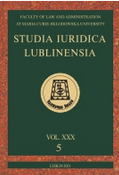The Legitimacy of Preliminary Questions to the Court of Justice of the European Union (CJEU) on the Legal Status of Supreme Court Judges in Poland
The Legitimacy of Preliminary Questions to the Court of Justice of the European Union (CJEU) on the Legal Status of Supreme Court Judges in Poland
Author(s): Zbigniew CzarnikSubject(s): EU-Legislation, Administrative Law
Published by: Wydawnictwo Naukowe Uniwersytetu Marii Curie-Sklodowskiej
Keywords: preliminary questions; Court of Justice of the European Union; National Council of the Judiciary; National Council of the Judiciary; retirement of judges; Polish law;
Summary/Abstract: The analysis presented in this article concerns the impact of Court of Justice of the European Union (CJEU) jurisprudence on the legal situation of Supreme Court and Supreme Administrative Court judges in Poland. The main assumption of the presented considerations is that the CJEU, in providing answers to preliminary questions submitted to it by Polish courts adjudicating cases related to judicial appointments and retirements, strengthens the independence of the courts and the independence of the judiciary, assuming that these are systemic elements of a functioning judiciary subject to EU law. For this reason, the CJEU considers itself competent to shape these systemic values under Polish law. At the same time, this body does not notice the problem of jurisdiction of Polish courts posing legal questions, which becomes an important theoretical and practical issue, because it may affect the legality and effectiveness of judgements passed on the basis of answers given by the CJEU. Detailed considerations focus on two types of judgements of the CJEU, which were made in connection with the retirement of judges, as a result of questions submitted to the Court by the Supreme Court and Supreme Administrative Court. The subject of the questions related to the compatibility with EU law of the scope of legal protection granted in Polish law to a judge against resolutions adopted in such cases by the National Council of the Judiciary. The considerations presented conclude that in the case of a CJEU judgement issued as a result of a question posed by the Supreme Court, the jurisdiction of the authority posing the question was infringed, and this should have consequences for the scope of binding the court adjudicating on the answer provided by the CJEU.
Journal: Studia Iuridica Lublinensia
- Issue Year: 30/2021
- Issue No: 5
- Page Range: 151-168
- Page Count: 18
- Language: English

